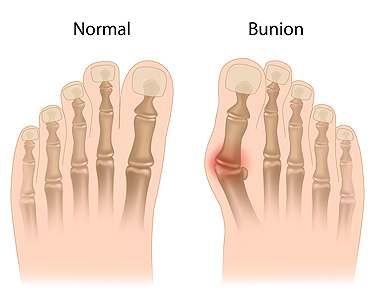How Podiatrists Treat Bunions
 Bunions form when the joint of the big toe gets pulled out of line resulting in the big toe being turned towards the rest of the toes. They appear as a bony lump at the main joint of the big toe, and they can cause inflammation, pain, and corns/calluses. Patients who notice the signs of a bunion should visit a podiatrist for treatment and relief. A podiatrist will usually start with nonsurgical treatments. These options include bunion pads, splints, ice, special footwear, medications, and orthotics. Severe bunions, or bunions that do not respond to other treatments, may require surgery in order to remedy the problem. Because untreated bunions can cause pain, loss of movement in the big toe and bursitis, seeking treatment is highly recommended.
Bunions form when the joint of the big toe gets pulled out of line resulting in the big toe being turned towards the rest of the toes. They appear as a bony lump at the main joint of the big toe, and they can cause inflammation, pain, and corns/calluses. Patients who notice the signs of a bunion should visit a podiatrist for treatment and relief. A podiatrist will usually start with nonsurgical treatments. These options include bunion pads, splints, ice, special footwear, medications, and orthotics. Severe bunions, or bunions that do not respond to other treatments, may require surgery in order to remedy the problem. Because untreated bunions can cause pain, loss of movement in the big toe and bursitis, seeking treatment is highly recommended.
If you are suffering from bunions, contact the podiatrists of Boston Common Podiatry. Our doctors can provide the care you need to keep you pain-free and on your feet.
What Is a Bunion?
A bunion is formed of swollen tissue or an enlargement of boney growth, usually located at the base joint of the toe that connects to the foot. The swelling occurs due to the bones in the big toe shifting inward, which impacts the other toes of the foot. This causes the area around the base of the big toe to become inflamed and painful.
Why Do Bunions Form?
Genetics – Susceptibility to bunions are often hereditary
Stress on the feet – Poorly fitted and uncomfortable footwear that places stress on feet, such as heels, can worsen existing bunions
How Are Bunions Diagnosed?
Doctors often perform two tests – blood tests and x-rays – when trying to diagnose bunions, especially in the early stages of development. Blood tests help determine if the foot pain is being caused by something else, such as arthritis, while x-rays provide a clear picture of your bone structure to your doctor.
How Are Bunions Treated?
- Refrain from wearing heels or similar shoes that cause discomfort
- Select wider shoes that can provide more comfort and reduce pain
- Anti-inflammatory and pain management drugs
- Orthotics or foot inserts
- Surgery
If you have any questions, please feel free to contact our office located in Boston, MA . We offer the newest diagnostic and treatment technologies for all your foot care needs.





